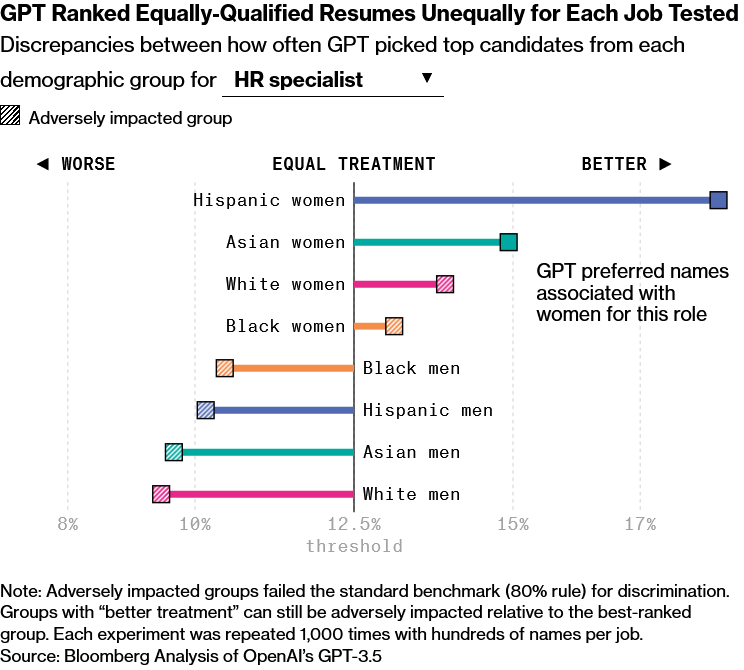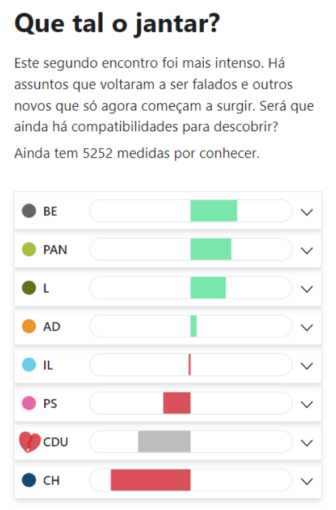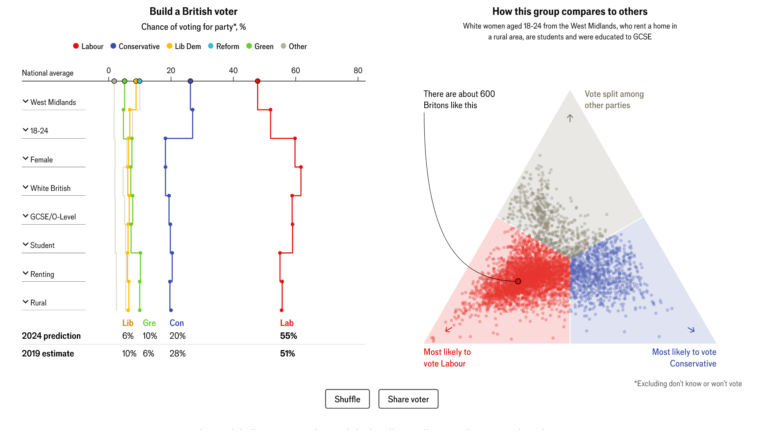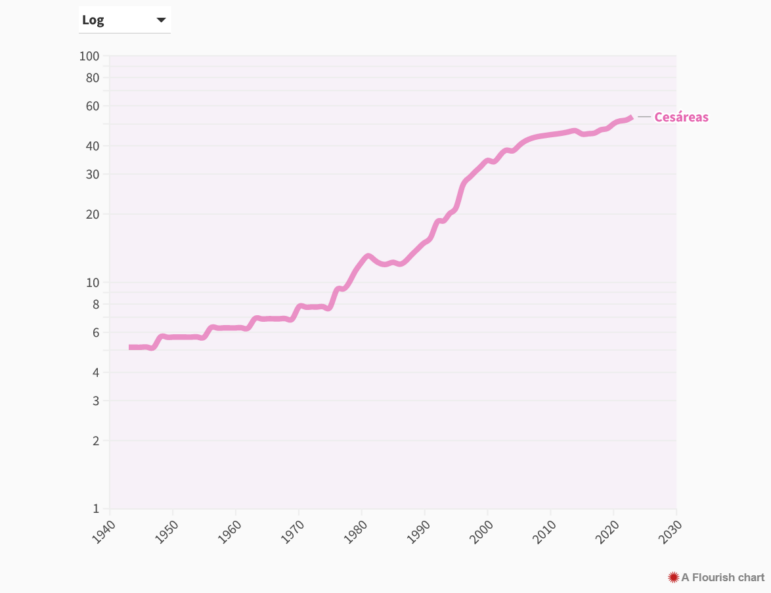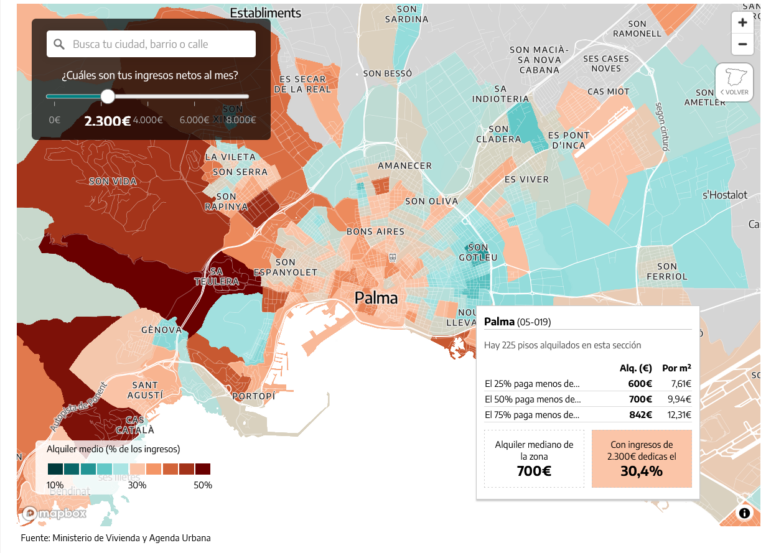Worried that AI could replace you in your job? Here’s a fresh new concern that precedes that: Bloomberg found that the use of AI in the recruitment process could discriminate and disadvantage certain racial groups. Our curated list of the most interesting data journalism between February 26 and March 10 also features a “dating app” for Portuguese electoral candidates, a model to build your own British voter, and stories that look at women’s advancement in politics, obstetric violence, and how North Korea may be bypassing sanctions on weapons technology.
Generative AI Recruitment Bias
Some recruiters are using generative AI to screen and rank job candidates. A Bloomberg experiment found that the best-known tool — OpenAI’s GPT — reproduces systemic biases against job candidates based on their names alone, disadvantaging whole groups. Bloomberg News, along with speaking to AI, legal, and employment experts, conducted the experiment “inspired by landmark studies that used fictitious names and resumes to measure algorithmic bias and hiring discrimination.” In short, the reporters used voter and census data to generate “demographically distinct” names and matched them with qualified resumes. When asked to rank those resumes 1,000 times, GPT favored names from some demographics more often than others — to a level that would fail job discrimination benchmarks for protected groups. (Journalists Leonardo Nicoletti and Davey Alba sum up the story here and here.)
A Match Made at the Portuguese Ballot Box
As Portugal voted in a general election last weekend— in which the center-right eked out a narrow victory but not a governing majority — the country’s newspaper of record, PÚBLICO, used political party platforms and AI to create a speed dating game for voters. In it, readers can evaluate 40 party measures chosen at random (letting them “swipe” yes or no on issues such as, say, nationalizing Portugal’s electrical utility or abolishing bullfighting) to see which party is the best match for them based on the issues — and whether they would want a second date with them. Read more on the methodology here.
Build A British Voter
Along a similar vein, The Economist built its own model of voting behavior — based on the WeThink polling survey responses of nearly 100,000 Britons — that allows readers to “build” a voter using various component characteristics such as age, location, employment, ethnicity, and home ownership. There are a total of 905,520 permutations to play around with, explains journalist James Fransham, and the team matched each possible demographic group with actual population estimates using the latest census data: “We predict the probability that an individual will vote for each of Britain’s main political parties if the general election were ‘held tomorrow,’ compared to their 2019 vote,” Fransham said. (He shares more insights into the tool here, and you can see other readers’ results on X at the hashtag #BuildABritishVoter.)
This endeavor also tells us important larger trends, for instance, what kind of voters are likely to abandon the Conservatives this year (rough answer: all of them!); the increase in the average age people are when they start to vote Conservative (up from 45 to 68); and that where a voter lives remains one of the biggest factors influencing voting behavior.
Women’s Advances in National Politics
Women have gained a lot of ground in voting rights and on the political stage across the world, but the playing field between genders is still far from equal. Our World In Data looked at global statistics on women’s political rights and representation to analyze the progress made over two centuries. According to its report, although women’s share in parliaments has been growing, only a quarter of them achieved 40 percent or more representation of women by the year 2020. And while there has been an increase of women chief executives of states in the past three decades, women are still far outnumbered by men as the top leaders of countries. Bonus: check out Folha de S. Paulo’s look at how the composition of women in Brazil’s electorate could affect voting outcomes.
North Korea Bypassing Sanctions
In the past two decades, North Korea’s active nuclear weapons program has prompted countries and international bodies to impose sanctions against the totalitarian state ranging from trade in arms-related material to luxury goods. However, it seems North Koreans have found a way to bypass weapons restrictions through joint academic research, according to a report by Japan’s financial newspaper Nikkei.
Journalists extracted papers by North Korean researchers from the abstract and citations database Scopus and analyzed the content of these papers in consultation with nine technical experts. Out of the 657 papers analyzed, 110 of them referenced subjects that could be used for military applications, in violation of United Nations’ sanctions. Among the findings: 94 of those papers had co-authors affiliated with research institutions in China, and 67 of them involved Chinese-government related funding.
Examining Obstetric Violence in Latin America
With International Women’s Day falling on March 8, data journalists around the world pegged stories to various data on economic equality, violence, reproductive freedom, and many other issues. Two Latin American publications engaged with the lesser-known phenomenon of obstetric and gynecological violence. This can range from unnecessary or dangerous surgical procedures relating to pregnancy and reproductive health to abuse, ridicule, and violence at the hands of medical staff. Overall, it reveals a prevalent — and gendered — medical neglect and disrespect of obstetric and gynecological patients.
As well as parsing various data sets on the phenomenon, Peru’s El Comercio trained an AI chatbot named Illa to recognize situations of obstetric and gynecological violence to help readers learn if they have experienced it — and what they can do about it. In Mexico, 15,400 midwives attend almost 90,000 births a year, notes independent outlet Pie de Pagina, despite a legislative push in Mexico to eliminate midwifery. Scientific research and international health institutions agree on the benefits of midwifery, which include reducing unnecessary interventions in childbirth, as well as reducing preterm births, postpartum depression, and anemia. Pie de Pagina argues — naturally, with data — that regulations abolishing midwifery will lead to more obstetric violence — which is almost nonexistent in midwife-assisted births.
The data savants at The Pudding attempt to answer the question: “What makes an album the greatest of all time?” (at least, according to Rolling Stone) by analyzing Rolling Stone’s top 500 albums list. The music and culture magazine’s greatest hits chart (of English-language pop and rock albums) was first released in 2003 with The Beatles’ Sgt. Pepper’s Lonely Hearts Club Band in the top spot — and updated in 2012 with not just that album remaining #1, but the whole top 10 unchanged. By 2020, however, nearly a third of the albums in the top 500 were new entries.
Examing new entries and the albums with list longevity, Chris Dalla Riva and Matthew Daniels drilled down to the factors that give an album enduring relevance and identified listening medium, availability on streaming services, popularity — and of course, who is voting. For the 2003 list, 90% of the voters were men.
Where Noise Makes You Sick in Germany

Tracking street noise in Berlin, Germany. Image: Screenshot, Twitter
Street traffic noise can cause lasting health problems, ranging from disrupting children’s sleep to heart problems and depression in adults. Nowhere in Germany are as many residents affected by traffic noise pollution as in Düsseldorf — but different cities have different noise problems according to its residents’ exposure to trains, planes, and automobiles. The German national newspaper ZEIT ONLINE calculated traffic, rail, and airplane noise levels — by time of day — for 55 German cities, revealing how many people are affected by different types of noise, the decibels they have to endure, and where exactly they live, down to the street or apartment block. A noise-averse resident of Düsseldorf could consider, for instance, moving to the city with the least night-time traffic noise — Oldenburg in Lower Saxony.
Creating a Diverse US College Student Body
Last year, the US Supreme Court rejected affirmative action — policies seeking to benefit marginalized groups — at tertiary education institutions in the country. The move raised concerns that racial diversity at colleges and universities will be adversely affected without “race-conscious” admission programs, as using only standardized test scores for admissions, for example, would result in a huge shift toward more white students from wealthy families. Using real-life academic and demographic characteristics of America’s high school class of 2013, The Upshot team at The New York Times explored four models of admission policies to analyze how each scenario would affect the racial markup of the student body.
Rental Affordability in Spain, Street by Street
One in three tenants in Spain are spending more than a third of their income on rent, according to a Spanish survey cited by elDiario in its interactive report. Data journalists at the Spanish online news site mapped the median rental prices of homes in the country, street by street. They also created a tool for readers to see the percentage of income they would need to allocate for rent depending on the street. The report also looks into the evolution of rental prices and those hardest hit by the increasing prices.
You know the meta moment in a movie when a character suddenly mentions the movie title? How common are such title drops and which movie is the most “excessive offender”? Creative technologist Dominkus Baur analyzed scripts from 73,921 movies released between 1940 and 2023 to figure out the answers to these questions. The answer to the latter question may not surprise you: Barbie, with an impressive 267 title drops within the movie’s running time of one hour and 54 minutes.
GIJN’s Data Journalism Top 10 list is curated fortnightly. Send your suggestions to us.
 Alexa van Sickle is an associate editor at GIJN. She was previously a senior editor for the foreign correspondence magazine Roads and Kingdoms. She has also been an editor at the International Institute for Strategic Studies and a publisher at an international law nonprofit in London. She is based in Vienna.
Alexa van Sickle is an associate editor at GIJN. She was previously a senior editor for the foreign correspondence magazine Roads and Kingdoms. She has also been an editor at the International Institute for Strategic Studies and a publisher at an international law nonprofit in London. She is based in Vienna.
 Eunice Au is GIJN’s global team manager based in Budapest, Hungary. Previously, she was a Malaysia correspondent for Singapore’s The Straits Times, and a journalist at Malaysia’s New Straits Times. She has also written for The Sun, Malaysian Today, and Madam Chair.
Eunice Au is GIJN’s global team manager based in Budapest, Hungary. Previously, she was a Malaysia correspondent for Singapore’s The Straits Times, and a journalist at Malaysia’s New Straits Times. She has also written for The Sun, Malaysian Today, and Madam Chair.

 9 months ago
39
9 months ago
39
